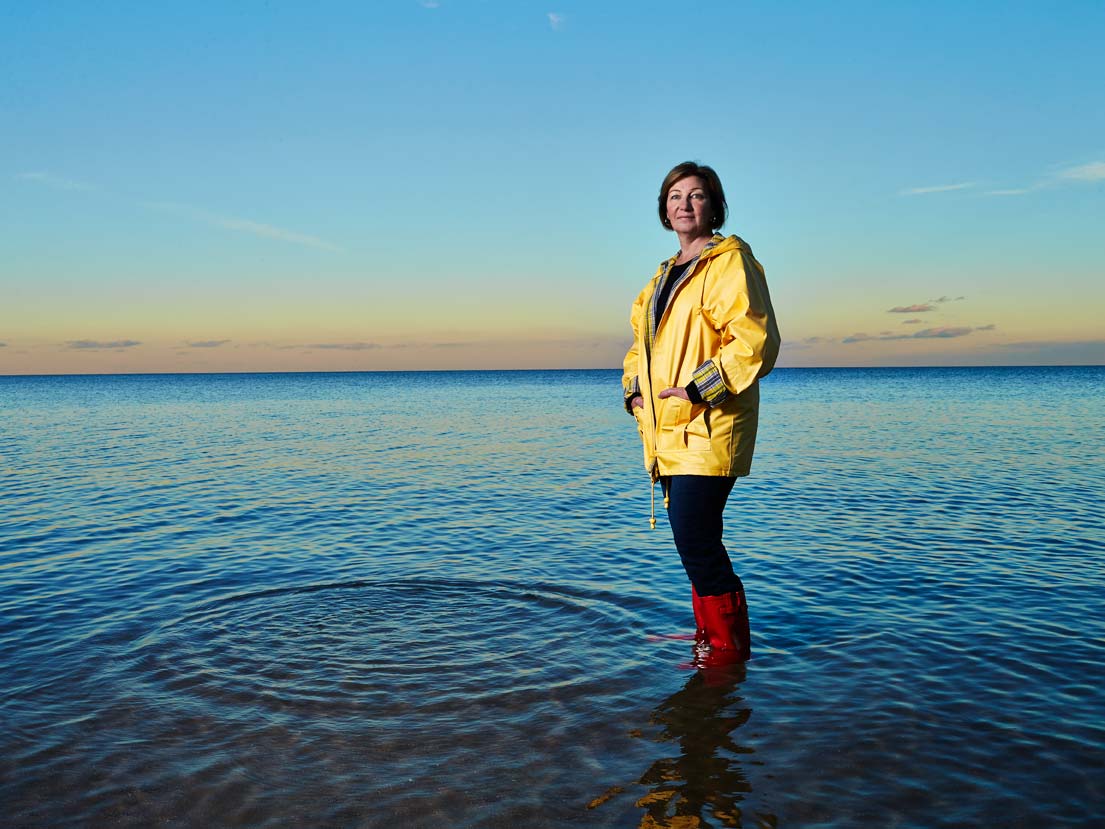TMU professor co-leading international research on climate change impacts on transboundary waters and vulnerable communities

TMU professor Carolyn Johns will co-lead the Global Center for Understanding Climate Change Impacts on Transboundary Waters as the social science principal investigator.
Toronto Metropolitan University (TMU) professor Carolyn Johns will co-lead a new global research centre that aims to identify, understand and mitigate the impacts of climate change on transboundary waters and their surrounding communities.
The Global Center for Understanding Climate Change Impacts on Transboundary Waters is a joint research project with the University of Michigan and McMaster University. The initial focus of this University of Michigan-led centre will be on climate change adaptation in the Great Lakes region with an emphasis on Indigenous and climate-vulnerable communities. It will later expand to other North American watersheds and beyond, preparing communities and ecosystems for the hazards that accompany climate change.
The centre, which received the equivalent of C$10.49 million of funding over five years, will bring together a diverse group of scientists and practitioners with expertise in climate change science, ecosystem monitoring and modelling, and transboundary water governance and policy. Professor Johns, who is the Interim Director of the School of Public Policy and Democratic Innovation, professor in the Department of Politics and Public Administration, Chair of the Bruce Fellowships in Canadian Freshwater Policy and a member of TMU’s Urban Water Centre, will co-lead the research team as the social science principal investigator on the project.
“Research focused on building community capacity for governance and management change, based on applied methods and traditional knowledge, is critical for adaptive governance in the Great Lakes region and other transboundary basins across North America and the globe,” said professor Johns. “Social science, Indigenous knowledge and policy research is critical for the centre to better understand and prepare communities for governance action and change.”
A key focus of the centre is to build capacity for governance and management systems that increase disaster resilience. Much of this work will help ensure Indigenous communities have the capacity to adapt to climate change through measures such as improved decision-making and strengthened partnerships. Research at the centre will also focus on developing reliable projections of the expected frequency and intensity of climate change impacts and improving understanding of climate change on ecosystems and diverse communities.
“Northern North America is one of the fastest-warming regions on the planet, and Indigenous communities along the transboundary watersheds between the U.S. and Canada are extremely vulnerable to the impacts of climate change,” said University of Michigan hydrologist and environment and sustainability professor Drew Gronewold, who will lead the centre as its principal investigator.
The tools and knowledge needed for communities to adapt are often nonexistent, inaccessible or fragmented across jurisdictional boundaries. The problem is especially complicated in transboundary water systems encompassing multiple sovereign nations and jurisdictions. The Great Lakes region, for example, is bounded by eight U.S. states and two Canadian provinces and is home to many Indigenous territories and communities, with 40 million people dependent on its transboundary waters.
“As communities continue to see the threat to water resources due to climate change in the form of floods, droughts, worsening water quality, shoreline erosion and damage to homes and infrastructure, we are forced to adapt,” said Gail Krantzberg, engineering professor and the centre’s principal investigator at McMaster University. “The tools and knowledge for adapting to worsening extremes must be consolidated or created with direct input from practitioners on the front line.”
“Congratulations to professor Johns on her leadership and participation in this project addressing the urgent issue of climate change,” said Steven N. Liss, TMU’s vice-president, research and innovation. “This research centre is an excellent example of the kind of multidisciplinary, international collaboration that is necessary to advance solutions to the intensifying challenges seen globally.”
The research team recently received US$5 million awarded to the University of Michigan from the National Science Foundation (NSF) and C$3.75 million in funding through the National Science Foundation Global Centres initiative, which is funded by the Natural Sciences and Engineering Research Council of Canada (NSERC) and Social Sciences and Humanities Research Council of Canada (SSHRC).
Additional partners in the project include Cornell University, the College of Menominee Nation, University of Wisconsin-Madison, Brock University, Wilfrid Laurier University, Red Lake Nation and Six Nations of the Grand River. Dozens of students are also expected to be involved.
Learn more about the National Science Foundation Global Centres initiative (external link) .